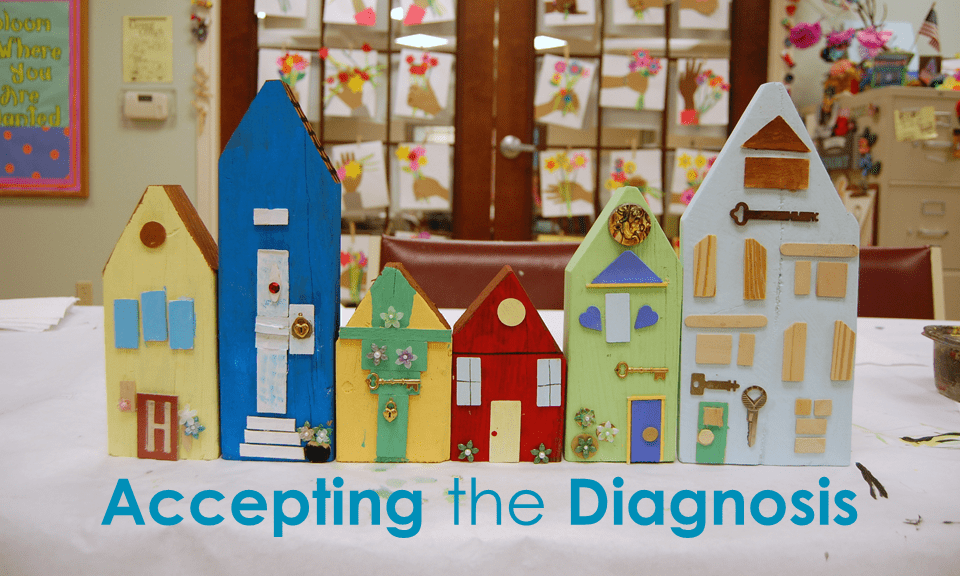Accepting the Diagnosis
Wednesday September 21, 2016

No one expects to be a caregiver to a loved one with dementia. No one plans for life to turn out this way, just as your loved one never planned on having dementia. Maybe you had plans to enjoy retirement, to travel, visit family, and spend time with grandchildren. Perhaps you are still working and raising your own children, yet you are in the throes of caring for a loved one with dementia.
NO ONE plans for life to be this way, so it can be hard to accept your new reality when it happens. Accepting a diagnosis of dementia is not a simple, overnight process. It takes time.
Before you can begin the process of accepting a diagnosis, it is very important to get a clear diagnosis. If you take your mom to an appointment and the doctor says, “She has cancer,” you do not say thank you and walk out the door. You ask questions. What type of cancer? Will it spread? What is the recommended treatment? What are the side effects? What is the prognosis? You need and want more information.
The same should be true with the diagnosis of dementia. If possible, it is important to get a clear diagnosis and to ask questions. What type of dementia? What stage? Are there medications that can help? Don’t be afraid to ask questions. Your loved one’s doctor can be an invaluable resource.
Accepting a diagnosis of dementia is ongoing. Once you have become accustomed to the new normal and how to deal with certain challenges, it suddenly changes. For example, in the past few months, your biggest challenge may have been your mom constantly wanting your attention, but now the challenge is that your mom is often uncooperative. You then have to accept the new normal, which could change again soon.
Individuals with dementia can no longer function as they once did, so you, as the caregiver, must learn to accept your loved one’s declining abilities and make adjustments. The harsh reality is that your relationship will change, and it cannot continue as it once was. Understanding and acceptance means you can have realistic expectations. With dementia, it is the caregiver that must change to suit his or her loved one. When a caregiver does not accept the new normal, it can lead to continual disappointment and anger and to wasted energy and a negative cycle of words and emotions.
So how do you accept your new normal? We asked family caregivers at Page Robbins for their best tips on accepting the changes and challenges that come along with a dementia diagnosis. These people are in your shoes. They get it. So we hope you’ll read these words and be encouraged, and we also hope you’ll put their advice to practice.
- “Be patient.”
- “Try to remember that your loved one is probably not doing ‘it’ to aggravate you.”
- “Your loved one can’t help it. It is the disease.”
- “Try not to snap at your loved one when you are frustrated. It only makes things worse.”
- “There comes a point in time when you simply can’t use logic with your loved one anymore, so don’t try. It just leads to more frustration for both of you.”
- “Constantly correcting the person is not good. Dementia is a separate reality. You can’t re-orient them – just as well as you know it is Sunday, your loved one thinks it is Tuesday. Why argue?”
- “Give yourself permission to not be perfect. We all have bad days and mess up. We all make mistakes. Just because you are a caregiver does not mean that you should now be prefect.”
- “Have a good doctor and enlist his or her help, especially for major changes such as switching to disposable briefs, taking away the keys, etc.”
- “Well-meaning people will say things they feel are helpful , when in reality it’s things they really should have kept to themselves. That person is not walking in your shoes and most likely doesn’t know all there is to know about you and your loved one.”
- “Keep your sense of humor. For God’s sake… it is OK to laugh!”
- “Accept help when offered.”
- “Learn the tricks. Build your tool kit (i.e. distraction, preferred family member, fiblets, keeping things simple, avoid arguments).”
- “Take Care of yourself!”
- “Being a caregiver isn’t rocket science… It’s much more difficult than that.”
If you’re looking for opportunities to connect with other caregivers, be sure to check out our caregiver support group opportunities. And feel free to call us to ask questions or seek guidance (901-854-1200). Even if your loved one lives hundreds of miles away and will never use our services, we’re happy to help.




